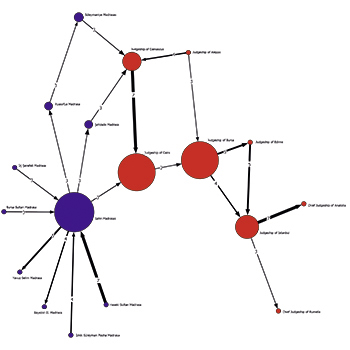Studying Professional Careers as Hierarchical Networks: A Case Study on the Careers of Chief Judges in the Ottoman Empire (1516–1622)
DOI:
https://doi.org/10.25517/jhnr.v7i1.113Keywords:
Ottoman Empire , scholar-bureaucrats , cursus honorum, professional career , hierarchical networkAbstract
In the Ottoman Empire, the scholarly-bureaucratic career track comprised several interconnected paths of teaching and judgeship positions. Scholar-bureaucrats, the civil servants of their day, chose from a variety of career options, and those who were especially successful could rise through the ranks to achieve the top positions in the land. In recent decades, several major studies have examined the careers of scholar-bureaucrats, but most have approached the topic using such conventional methods as qualitative analysis of historical texts and manual manipulation of data. In this article, distinct from previous studies, we adopt the perspective of social network analysis (SNA) to analyze the positions in the careers of Ottoman scholar-bureaucrats as a hierarchical network. Using formal SNA methods, we examine the careers of the 56 scholar-bureaucrats (ulema) in Ottoman government service who reached the two top positions – the chief judgeships (kazaskerlik) of Anatolia and Rumelia – during the period 1516–1622. As this article will show, this approach makes it possible to produce new knowledge that is difficult to acquire through conventional historical research, as well as to confirm, correct, and qualify existing knowledge on the subject.

Downloads
Published
How to Cite
Issue
Section
License
Copyright (c) 2022 Abdurrahman Atçıl, Gürzat Kami

This work is licensed under a Creative Commons Attribution-NoDerivatives 4.0 International License.
A Creative Commons Attribution-NoDerivatives 4.0 (CC BY-ND 4.0) license applies to all contents published in JHNR. While articles published on JHNR can be copied by anyone for noncommercial purposes if proper credit is given, all materials are published under an open-access license with authors retaining full and permanent ownership of their work. For details please consult the Open Access and Copyright Notice.

